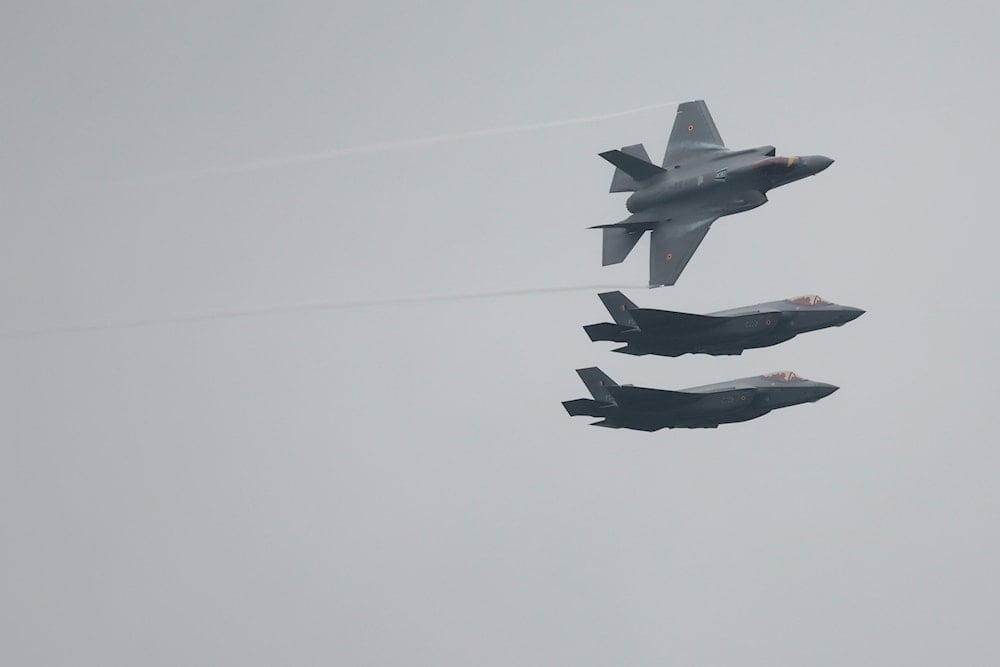US fears F-35 sale to Saudi Arabia may aid China
The Pentagon has raised concerns that selling F-35 jets to Saudi Arabia could expose advanced US military technology to China, risking "Israel's" military edge in the region.
-

Three F-35A Lightning II's fly in formation on the occasion of the first F-35 fighter jets arriving at the Florennes Airbase in Florennes, Belgium, Monday, Oct. 13, 2025 (AP)
Concerns are growing that China could acquire the F-35's advanced technology if a sale of the warplanes to Saudi Arabia is completed, even as the Trump administration is trying to finalize such a deal, The New York Times reported, citing Pentagon officials briefed on the subject.
According to people briefed on the issues, Pentagon officials who have studied the deal have expressed fears, which were outlined in a broad report compiled by the Defense Department's Defense Intelligence Agency, claiming that F-35 technology could be compromised either through Chinese espionage or through China’s security partnership with Saudi Arabia.
The Trump administration and Saudi Arabia have been trying to work out the final elements of an agreement where US weapons manufacturers would sell 48 F-35 jets to Saudi Arabia for billions of dollars. Moreover, Defense Secretary Pete Hegseth was expected to approve the agreement before it continued through an interagency review process, according to the people.
Crown Prince Mohammed bin Salman, the de facto leader of Saudi Arabia, is scheduled to meet with President Trump at the White House on Tuesday. According to US officials, their discussion will focus on a potential F-35 deal and a mutual defense agreement, underscoring the relationship with the world's top buyer of American weapons.
America first? More like 'Israel's' security first
Beyond the concerns over China acquiring F-35 technology, the proposed sale also raises questions about whether the US government would be compromising "Israel's" regional military advantage, which is currently maintained as "Israel" is the only party in the Middle East that has F-35 jets.
Since the October 1973 war, US policymakers have sought to ensure that "Israel" maintains its “qualitative military edge” in the region, a policy which in previous administrations was upheld through a highly classified, monthslong interagency process to review whether proposed weapons sales in the region would be consistent with that commitment.
Congress states that the United States must ensure that "Israel" can defeat “any credible conventional military threat” while sustaining “minimal damage and casualties.”
The case of the UAE: Deal fizzles over stringent demands
In 2020, the Trump administration agreed to sell F-35 jets to the United Arab Emirates as part of the "Abraham Accords", a move some US officials objected to due to the UAE's close partnership with China and fears it would weaken "Israel's" military advantage.
The Biden administration suspended the sale in 2021, primarily over fears that China could acquire the F-35's technology. The US subsequently demanded stringent security measures, including the installation of kill switches to remotely disable the jets, demands which Emirati officials deemed too onerous, causing the deal to fizzle.
US weighs similar safeguards with Saudi deal
The same technological security concerns are now emerging with the proposed sale to Saudi Arabia, prompting US officials to discuss potential safeguards for the F-35, though the specific measures that might be included in a final agreement or recommended by the Pentagon's intelligence report remain unclear.
Gareth Jennings, the aviation editor of the defense intelligence firm Janes, said that for Saudi Arabia, acquiring America's premier F-35 fighter jet would give its air force major advantages in stealth and would help its pilots assess a complex battle space in ways its existing fighter fleet cannot.
President Trump frequently boasts of his deals with oil-rich Saudi Arabia, particularly on arms sales. A May White House announcement of $600 billion in agreements, including $142 billion for weapons, exemplified this. However, many of the promoted commercial projects predated his administration.

 4 Min Read
4 Min Read










